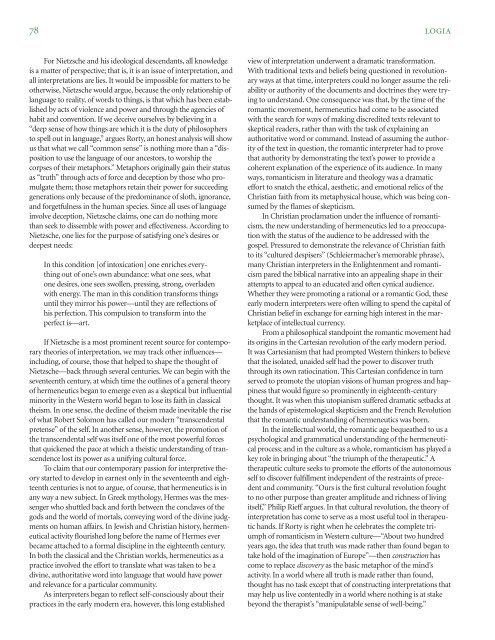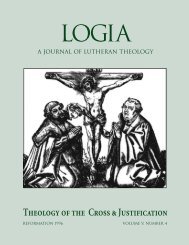04-2 Hermeneutics.pdf
04-2 Hermeneutics.pdf
04-2 Hermeneutics.pdf
- No tags were found...
You also want an ePaper? Increase the reach of your titles
YUMPU automatically turns print PDFs into web optimized ePapers that Google loves.
78 LOGIAFor Nietzsche and his ideological descendants, all knowledgeis a matter of perspective; that is, it is an issue of interpretation, andall interpretations are lies. It would be impossible for matters to beotherwise, Nietzsche would argue, because the only relationship oflanguage to reality, of words to things, is that which has been establishedby acts of violence and power and through the agencies ofhabit and convention. If we deceive ourselves by believing in a“deep sense of how things are which it is the duty of philosophersto spell out in language,” argues Rorty, an honest analysis will showus that what we call “common sense” is nothing more than a “dispositionto use the language of our ancestors, to worship thecorpses of their metaphors.” Metaphors originally gain their statusas “truth” through acts of force and deception by those who promulgatethem; those metaphors retain their power for succeedinggenerations only because of the predominance of sloth, ignorance,and forgetfulness in the human species. Since all uses of languageinvolve deception, Nietzsche claims, one can do nothing morethan seek to dissemble with power and effectiveness. According toNietzsche, one lies for the purpose of satisfying one’s desires ordeepest needs:In this condition [of intoxication] one enriches everythingout of one’s own abundance: what one sees, whatone desires, one sees swollen, pressing, strong, overladenwith energy. The man in this condition transforms thingsuntil they mirror his power—until they are reflections ofhis perfection. This compulsion to transform into theperfect is—art.If Nietzsche is a most prominent recent source for contemporarytheories of interpretation, we may track other influences—including, of course, those that helped to shape the thought ofNietzsche—back through several centuries. We can begin with theseventeenth century, at which time the outlines of a general theoryof hermeneutics began to emerge even as a skeptical but influentialminority in the Western world began to lose its faith in classicaltheism. In one sense, the decline of theism made inevitable the riseof what Robert Solomon has called our modern “transcendentalpretense” of the self. In another sense, however, the promotion ofthe transcendental self was itself one of the most powerful forcesthat quickened the pace at which a theistic understanding of transcendencelost its power as a unifying cultural force.To claim that our contemporary passion for interpretive theorystarted to develop in earnest only in the seventeenth and eighteenthcenturies is not to argue, of course, that hermeneutics is inany way a new subject. In Greek mythology, Hermes was the messengerwho shuttled back and forth between the conclaves of thegods and the world of mortals, conveying word of the divine judgmentson human affairs. In Jewish and Christian history, hermeneuticalactivity flourished long before the name of Hermes everbecame attached to a formal discipline in the eighteenth century.In both the classical and the Christian worlds, hermeneutics as apractice involved the effort to translate what was taken to be adivine, authoritative word into language that would have powerand relevance for a particular community.As interpreters began to reflect self-consciously about theirpractices in the early modern era, however, this long establishedview of interpretation underwent a dramatic transformation.With traditional texts and beliefs being questioned in revolutionaryways at that time, interpreters could no longer assume the reliabilityor authority of the documents and doctrines they were tryingto understand. One consequence was that, by the time of theromantic movement, hermeneutics had come to be associatedwith the search for ways of making discredited texts relevant toskeptical readers, rather than with the task of explaining anauthoritative word or command. Instead of assuming the authorityof the text in question, the romantic interpreter had to provethat authority by demonstrating the text’s power to provide acoherent explanation of the experience of its audience. In manyways, romanticism in literature and theology was a dramaticeffort to snatch the ethical, aesthetic, and emotional relics of theChristian faith from its metaphysical house, which was being consumedby the flames of skepticism.In Christian proclamation under the influence of romanticism,the new understanding of hermeneutics led to a preoccupationwith the status of the audience to be addressed with thegospel. Pressured to demonstrate the relevance of Christian faithto its “cultured despisers” (Schleiermacher’s memorable phrase),many Christian interpreters in the Enlightenment and romanticismpared the biblical narrative into an appealing shape in theirattempts to appeal to an educated and often cynical audience.Whether they were promoting a rational or a romantic God, theseearly modern interpreters were often willing to spend the capital ofChristian belief in exchange for earning high interest in the marketplaceof intellectual currency.From a philosophical standpoint the romantic movement hadits origins in the Cartesian revolution of the early modern period.It was Cartesianism that had prompted Western thinkers to believethat the isolated, unaided self had the power to discover truththrough its own ratiocination. This Cartesian confidence in turnserved to promote the utopian visions of human progress and happinessthat would figure so prominently in eighteenth-centurythought. It was when this utopianism suffered dramatic setbacks atthe hands of epistemological skepticism and the French Revolutionthat the romantic understanding of hermeneutics was born.In the intellectual world, the romantic age bequeathed to us apsychological and grammatical understanding of the hermeneuticalprocess; and in the culture as a whole, romanticism has played akey role in bringing about “the triumph of the therapeutic.” Atherapeutic culture seeks to promote the efforts of the autonomousself to discover fulfillment independent of the restraints of precedentand community. “Ours is the first cultural revolution foughtto no other purpose than greater amplitude and richness of livingitself,” Philip Rieff argues. In that cultural revolution, the theory ofinterpretation has come to serve as a most useful tool in therapeutichands. If Rorty is right when he celebrates the complete triumphof romanticism in Western culture—“About two hundredyears ago, the idea that truth was made rather than found began totake hold of the imagination of Europe”—then construction hascome to replace discovery as the basic metaphor of the mind’sactivity. In a world where all truth is made rather than found,thought has no task except that of constructing interpretations thatmay help us live contentedly in a world where nothing is at stakebeyond the therapist’s “manipulatable sense of well-being.”
















